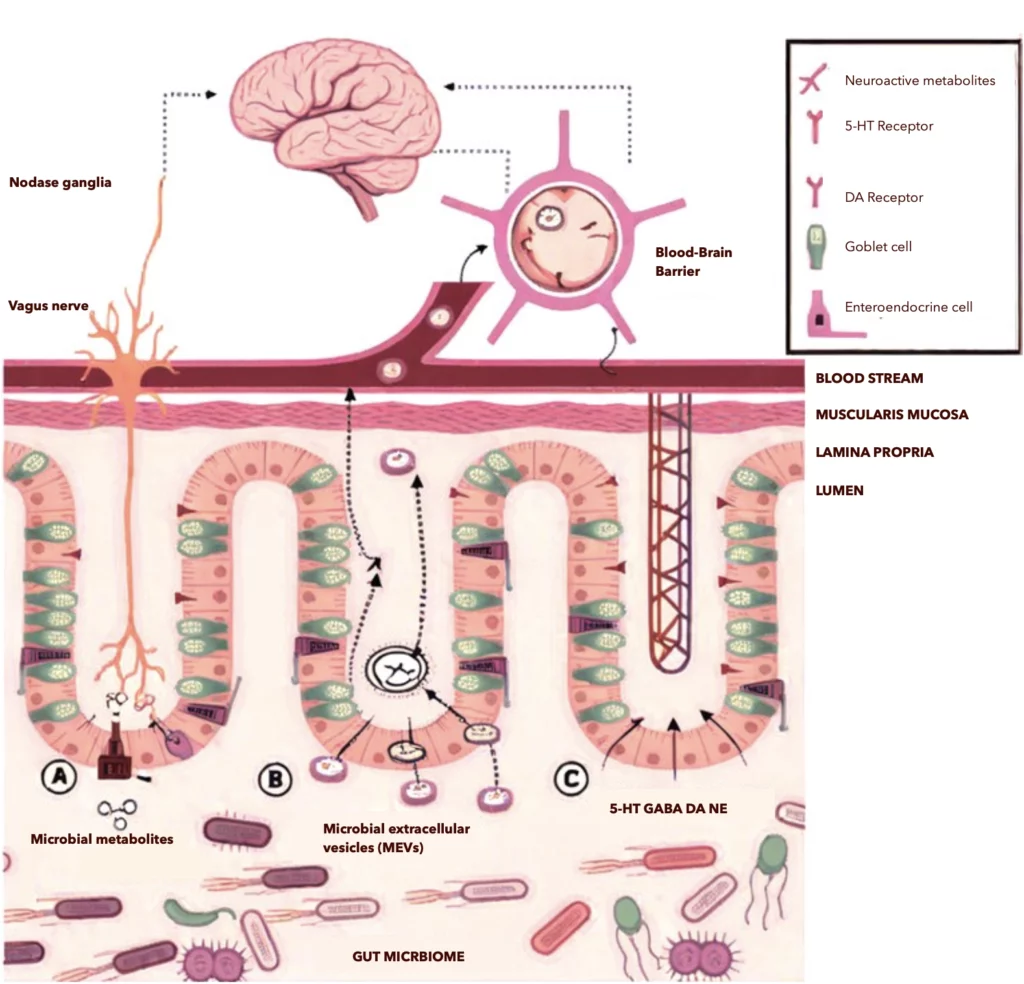Neuromicrobiology, an Emerging Neurometabolic Facet of the Gut Microbiome?
-
Brain Health
Brain Health
Brain health encompasses the overall functioning and well-being of the brain, including cognitive function, emotional and psychological well-being, neurological integrity, behavioral health, neurodevelopmental health, age-related brain health, and brain resilience and plasticity.
Microbiome Signatures identifies and validates condition-specific microbiome shifts and interventions to accelerate clinical translation. Our multidisciplinary team supports clinicians, researchers, and innovators in turning microbiome science into actionable medicine.
Karen Pendergrass is a microbiome researcher specializing in microbiome-targeted interventions (MBTIs). She systematically analyzes scientific literature to identify microbial patterns, develop hypotheses, and validate interventions. As the founder of the Microbiome Signatures Database, she bridges microbiome research with clinical practice. In 2012, based on her own investigative research, she became the first documented case of FMT for Celiac Disease—four years before the first published case study.
What Was Reviewed?
The paper reviews the emerging field of neuromicrobiology, which explores the interactions between the gut microbiome and the brain, particularly focusing on how gut microbiota produce neuroactive metabolites that influence cognitive function and brain health. It addresses the biosynthesis, absorption, and transport of these neuroactive metabolites, including neurotransmitters such as γ-aminobutyric acid (GABA), serotonin, dopamine, and others. The review also discusses how these compounds interact with the gut-brain axis and their implications for mental health and neurological disorders.
Who Was Reviewed?
The review synthesizes research across multiple studies involving both human and animal models. It examines the gut microbiota’s role in producing neuroactive compounds and their potential effects on the central nervous system (CNS). The paper does not focus on a specific population but rather on a broad range of studies that include both healthy and diseased subjects to understand the underlying mechanisms of gut-brain communication via microbial metabolites.
What Were the Most Important Findings of This Review?
Diversity of Neuroactive Metabolites:
The review highlights the diversity of neuroactive metabolites produced by the gut microbiome, including neurotransmitters like GABA, serotonin, dopamine, and their precursors. These metabolites are synthesized by a variety of gut bacteria, and their production is influenced by factors such as diet, genetics, and environmental conditions.
Mechanisms of Interaction with the Brain:
The paper details the pathways through which these neuroactive metabolites interact with the brain, emphasizing the “bottom-up” pathway of the gut-brain axis. This includes the direct signaling of neurotransmitters via the vagus nerve, modulation of the immune system, and the transport of metabolites across the blood-brain barrier (BBB) via transport proteins or secreted microbial extracellular vesicles (MEVs).
Impact on Mental Health and Neurological Disorders:
The review discusses how dysbiosis (an imbalance in gut microbiota) is linked to various mental health disorders, including depression, anxiety, and neurodegenerative diseases like Alzheimer’s and Parkinson’s. It suggests that microbial metabolites could play a significant role in the pathophysiology of these conditions, offering potential targets for therapeutic interventions.
Microbiota-Targeted Interventions (MBTIs):
The paper underscores the potential of microbiome-targeted interventions (MBTIs), such as prebiotics, probiotics, synbiotics, and postbiotics, to modulate gut-brain interactions. However, it also notes that the precise mechanisms underlying these interventions are not fully understood, which limits their current therapeutic application.
Challenges and Future Directions:
A major theme is the complexity and challenges of translating current findings into clinical practice. The review identifies gaps in understanding how microbial neuroactive metabolites specifically influence brain function and calls for more mechanistic studies to establish causality and therapeutic potential.
What Are the Greatest Implications of This Review?
Advancement of Neuromicrobiology:
The review positions neuromicrobiology as a crucial field for understanding the gut-brain axis and its impact on brain health. It suggests that advances in this area could lead to novel approaches for preventing and treating neurological and psychiatric disorders by targeting the gut microbiome.
Potential for Novel Therapeutics:
The insights into microbial production of neuroactive compounds open up possibilities for developing new microbiota-targeted therapies. These could include specific probiotics engineered to produce neurotransmitters, or prebiotic diets designed to enhance the production of beneficial metabolites, which could be tailored to individual patient needs based on their gut microbiome composition.
Integration of Multi-Omics Approaches:
The paper calls for the integration of metagenomic, metabolomic, and transcriptomic data to better understand the microbiome-gut-brain axis. This could enable a more comprehensive understanding of how gut microbes influence brain health and lead to the identification of biomarkers for disease or targets for intervention.
Need for Mechanistic Research:
The “Neuromicrobiology, an Emerging Neurometabolic Facet of the Gut Microbiome?” review emphasizes the need to move beyond correlation studies and towards mechanistic research that clarifies how specific gut microbes and their metabolites influence brain function. This will be critical for developing evidence-based therapeutic applications and understanding individual variability in response to microbiome-targeted interventions.
Implications for Public Health:
By highlighting the role of the gut microbiome in brain health, the review suggests that dietary and lifestyle interventions targeting the gut microbiome could become a key component of public health strategies for preventing cognitive decline and mental health disorders.

Brain health encompasses the overall functioning and well-being of the brain, including cognitive function, emotional and psychological well-being, neurological integrity, behavioral health, neurodevelopmental health, age-related brain health, and brain resilience and plasticity.
Microbiome Targeted Interventions (MBTIs) are cutting-edge treatments that utilize information from Microbiome Signatures to modulate the microbiome, revolutionizing medicine with unparalleled precision and impact.
Brain health encompasses the overall functioning and well-being of the brain, including cognitive function, emotional and psychological well-being, neurological integrity, behavioral health, neurodevelopmental health, age-related brain health, and brain resilience and plasticity.
